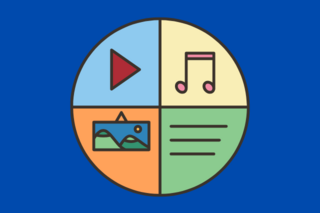Online
Past Event: Disability and Media 4-6 pm on Zoom, Monday April 7

This event has passed.
- Past Event: Mon Apr 7, 2025 4:00 p.m.—6:00 p.m.
Accessibility in media and the arts has increasingly become a topic of concern within Disability communities worldwide. In this series of presentations and discussions, we will pause to consider the strides that have been made to underscore the importance of media and arts access, and how we can continue to forge a path towards holistic accessibility for all. ASL and CART services will be provided.
Schedule
4 pm: Making films INclusive, not Exclusive
Presented by Natália Centková, LLM
Cinemas have the potential to be powerful drivers of inclusivity, impacting all aspects of the film chain – from production and distribution to presentation and beyond. True inclusion of diverse audiences encompasses accessible programming, physical spaces, communication, and a commitment to organizational practices and services.
With approximately 1.3 billion people – 16% of the global population – living with some form of disability, it is crucial for cinemas, which have historically served as important community gathering spaces, to engage meaningfully with this demographic. Without concerted efforts toward accessibility, what was once the most democratic art form risks becoming an exclusive domain for the privileged.
"Making Films INclusive, not EXclusive" will showcase inspirational best practices from European cinemas. These efforts aim to promote tolerance, equity, and diversity through transformative cinematic experiences that raise awareness, build diverse audiences, and catalyze social change.
4:30 pm: Access as Praxis: A conversation between disability arts and culture practitioners
Presented by Bri Noonan, Amelia-Marie Altstadt, Joy Young, Maggie Bridger, Sam Weiss, Sydney Erlikh and Terri Lynne Hudson
Chicago historically has contributed to disability arts and culture through their festivals, organizations, and fellowships. Access Living was the first US center of independent living to have a disability arts and culture project. Acknowledging the importance of disability art and culture to building an inclusive and accessible society. This lineage continues to impact how current practitioners utilize access. As Chicago-based disability practitioners, artists, and scholars, we explore how building creative access expands artistic work and challenges disability culture. Creative access contrasts with access models that retroactively incorporate access as an individual accommodation. This roundtable includes experts in developing and facilitating a broad array of disability arts and culture programming- from dance, theatre, visual arts, poetry, storytelling, and literature in settings as formal as museums and as informal as their own homes. Reflecting on our collective experiences as practitioners, we examine how creative access shifts in diverse spaces, considering how it is implemented in virtual, hybrid, and in-person event spaces. Collectively, we grapple with the multilayered complexities of accessibility for disabled practitioners, disabled access workers, and audiences. We explore how creative access impacts the creative process and how we negotiate access conflicts. We consider how to engage the community in conversations about accessibility. While this conversation focuses on accessibility within disability arts programming, these accessibility practices have further-reaching applications and implications.
5 pm: Perspective: Highlighting Disability Voices and Viewpoints through Artistry and Accessibility
Presented by Molly Joyce
I will present Perspective, an ongoing project featuring disabled interviewees responding to what access, care, interdependence, and more mean to them. Their voices are highlighted aurally with musical underscoring and visually through open-caption and sign-language videos.
Perspective stemmed from dialogue with disability activist Judith Heumann, who asked why I refer to my left hand as “weak.” My left hand was nearly amputated in a car accident twenty years ago, and it took almost twenty years to identify as disabled and embrace it. However, despite my evolution, I referred to my disability as a “weakness” and categorized it within narrowly defined social constructions of what weakness can and should be. That set the impetus for Perspective, which features contributions from disabled participants and asks what broad yet disability-specific terms mean to them, such as “What is access for you?” and “What is interdependence for you?”
Through this presentation, I aim to emphasize the themes of musical democracy in action, including community and interview-based projects, as well as ethical scholarship and DEI initiatives within musical contexts. The project’s questions, such as care and interdependence, underscore values from disability culture and put them in a musical context. Additionally, the project has connected disabled and nondisabled communities, such as with The Woodlands in Pittsburgh, and forthcoming with Community Access to the Arts (CATA) in Massachusetts and a public art iteration in Düsseldorf, Germany.
5:15 pm: Q&A and Discussion
Moderated by Charles Eppley